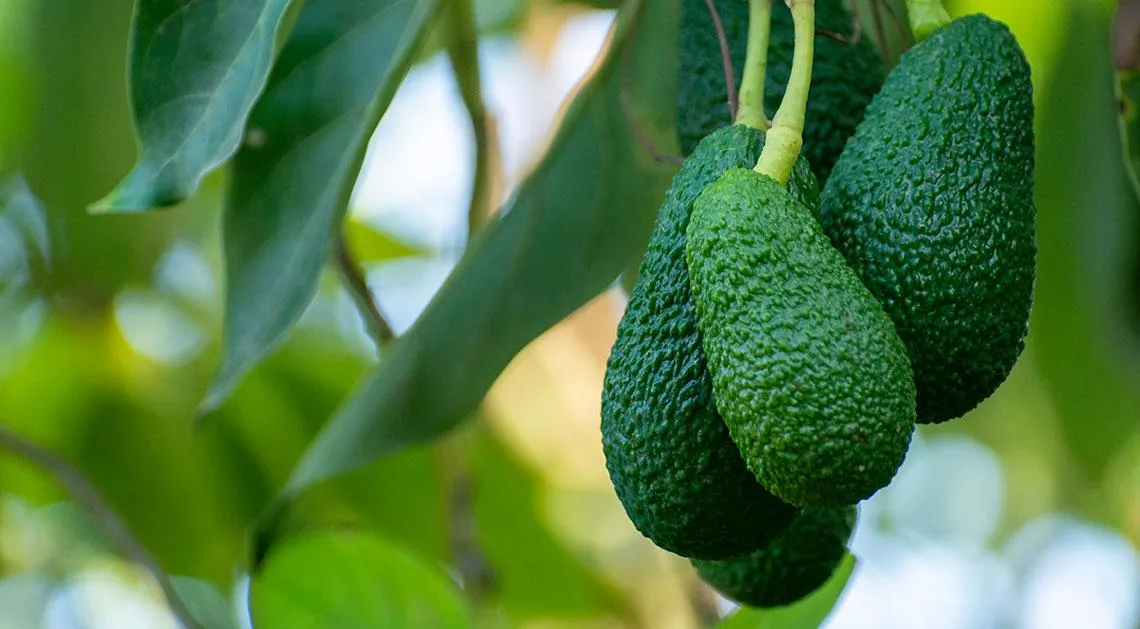Mexican Avocado: The Little Green Fruit that Tilted the Rank of the Nogales District

Among many new developments since the beginning of the 21st century, the exponential popularity of avocados has been one that profoundly affected the composition of agricultural imports from Mexico. Compared with tomatoes, avocados comprise a relatively lesser commodity for the Nogales District. In 2018, $35.3 million worth of avocados was imported from Mexico through Arizona border ports compared to $576.8 million worth of imported tomatoes. 1
Several other agricultural commodities imported from Mexico through the Nogales District are also ahead of avocados, such as cucumbers worth $289.8 million. Yet, avocados seem to draw attention for several reasons. In addition to becoming one of the most favorite fruits in the U.S., avocados also contributed to the expansion of overall value of Mexican-grown produce imported through Texas border ports of entry , thus indirectly affecting the once top position of the Nogales District.
The background
Geography and U.S. trade policy accounted for a delay in the importing of Mexican-grown avocados through the Nogales District ports. To protect domestic avocado growers in California, the importation of Mexican-grown avocados through San Diego and Nogales districts was delayed until 2007. 2 That gave the Texas ports of entry an early advantage, as they were the first to open to Mexican-grown avocados. More importantly, though, has been the fact that the major avocado growing areas are in central Mexico, where the distances to the U.S.-Mexico international line are shorter from Texas than from the Arizona or California border ports of entry.
Major producing regions in Mexico
As shown in Figure 1 , major avocado producing regions are located in central Mexican states. Overwhelmingly, production is concentrated in the state of Michoacán accounting for three-quarters of all production in Mexico in 2018. 3 Two other states, Jalisco and Mexico, together contribute an additional 14% to Mexico’s annual avocado production. All other states taken together produce less than 10% of annual tonnage.
Note: All maps and charts in this article are interactive – scroll over columns or lines for more detailed information.
Figure 1. Avocado Production in Mexico (tonnage by state in 2018)
Growers, packers, and distributors: Emerging cross-border integration
Like with other economic activities in North America, cross-border economic integration blurs the distinction between “Mexican avocados” and “in-Mexico-grown avocados.” While most growers in Michoacán are native small and medium size producers, a growing number of U.S.-based companies have engaged directly in production. For example, Texas-based Agroexport Avocados established its production base in Mexico as early as 2002; California-based Calavo Growers followed several years later. 4 More frequently, however, U.S.-based companies engage in packing and distribution. The most prevalent model is one of establishing partnerships with Mexican companies. According to The Avocado Producers and Exporting Packers Association of Mexico (APEAM), 46% of avocados exported from Mexico in 2017 were packed by subsidiaries of U.S. companies. 5
Avocado imports surpass once dominant tomatoes
Figure 2 shows the impressive rise of avocado imports from Mexico since the last restrictions were lifted in 2007. By 2012, the value of imported avocados through the four southern border districts reached approximately one-half the value of imported tomatoes. In 2017, avocado imports, valued at $2.3 billion, surpassed imported tomatoes ($1.8 billion) for the first time. While the difference between the two imported commodities decreased somewhat in 2018, avocados still held the top position. With the recently evoked restrictions on Mexico-grown tomatoes (following the Tomato Suspension Agreement), 6 it is likely that avocados will continue on the path of the most valued fresh produce commodity from Mexico.
Figure 2. Avocado Imports vs. Tomatoes (in millions of U.S. dollars)
Note: The southern border districts are San Diego (CA), Nogales (AZ), El Paso (TX), and Laredo (TX).
Laredo District: Overwhelming dominance in avocado imports from Mexico
The Laredo District has dominated imports of Mexican-grown avocados since the early days in 2005. With the exception of 2007, when the restriction on imports were lifted for the Nogales and San Diego districts, more than 90% of all avocados enter the United States through Texas ports of entry every year. Figure 3 clearly shows the unique importance of the Laredo District in avocado trade, accounting for 97% in 2018.
Figure 3. Percent Share of Laredo District in 2018 Avocado Imports
Avocado imports through Nogales District keep relatively steady
The first big jump in avocado trade through the Nogales District occurred in 2007, when $33.4 million worth of Mexican-grown avocados were imported. Since then, the dollar value of imported avocados fluctuated from year to year, reaching $50.7 million in 2013. During the last four years, imports of avocados through the Nogales District were in the range of $30 and $36 million, as shown in Figure 4 .
Figure 4. Imported Avocados through Nogales District 2005-2018 (in millions of U.S. dollars)
At least for now, geography favors Texas ports of entry
Unlike tomatoes that can be grown in greenhouses, making their production less dependent on climate conditions, avocados are grown only on trees. They require specific climate, elevation, and soil conditions, a combination of which is the most ideal in Michoacán. Even with production expanding in nearby states, it will remain, at least in the near future, concentrated in central part of Mexico.
Notes
- Nogales District encompasses six border ports of entry in Arizona, from west to east: San Luis, Lukeville, Sasabe, Nogales, Naco and Douglas.
- “Mexico praises lifting of last U.S. avocado import barriers,” The Associated Press, International Tribune, Business Section, February 2, 2007. http://www.sddt.com/News/article
- Servicio de Informacion de Agroalimentaria y Pesquera (SIAP). http://infosiap.siap.gob.mx:8080/agricola_siap_gobmx/ResumenProducto.do
- Agroexport LLC, https://agroexportavocados.com/history ; Calavo Growers, www.freshfruitportal.com
- www.freshfruitportal.com
- U.S. Department of Commerce. “U.S International Trade Commission affirmative injury vote reinforces Commerce’s Tomato Suspension Agreement,” Press Release, November 22, 2019. https://www.commerce.gov/news/press-releases/2019/11/us-international-trade-commission-affirmative-injury-vote-reinforces

